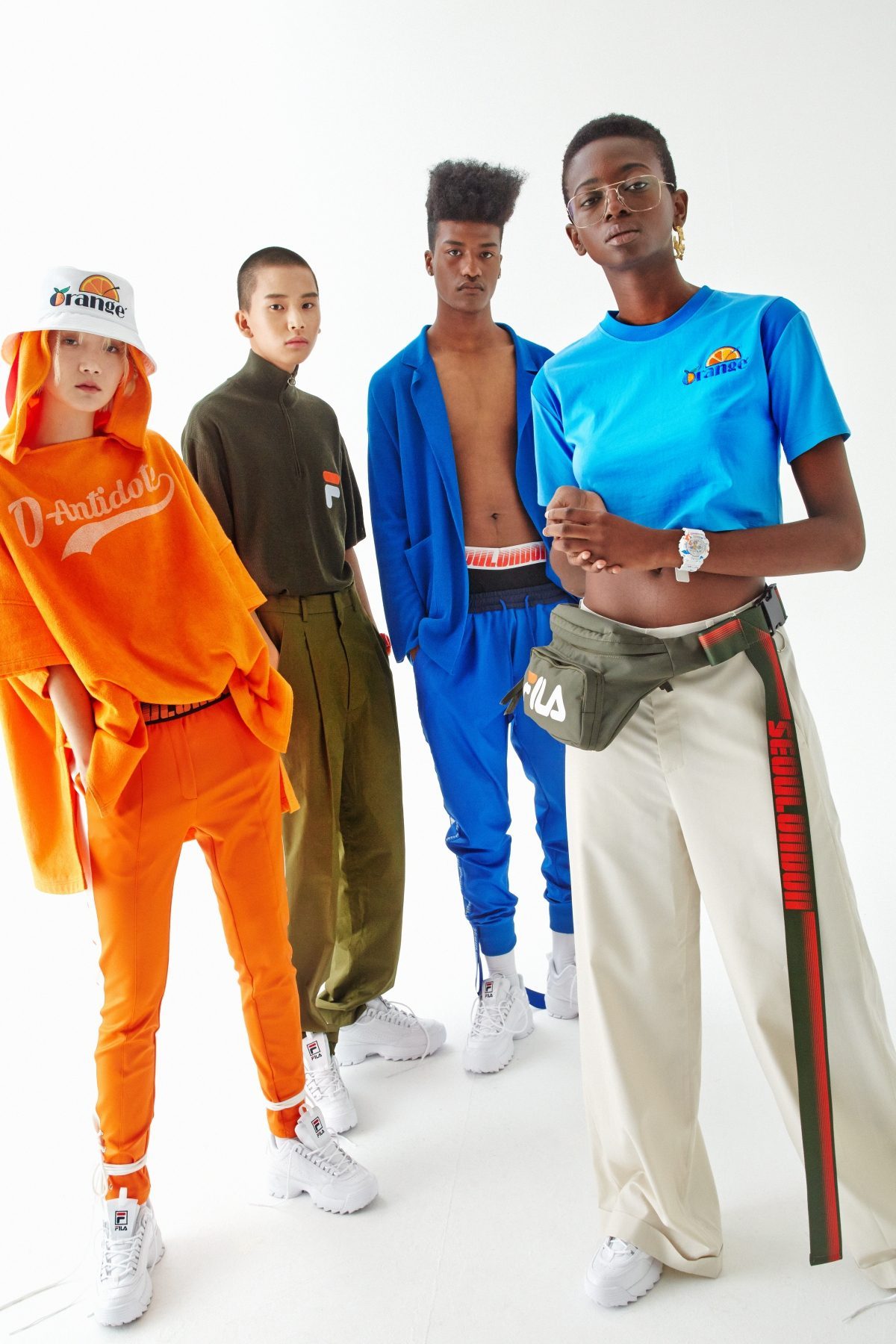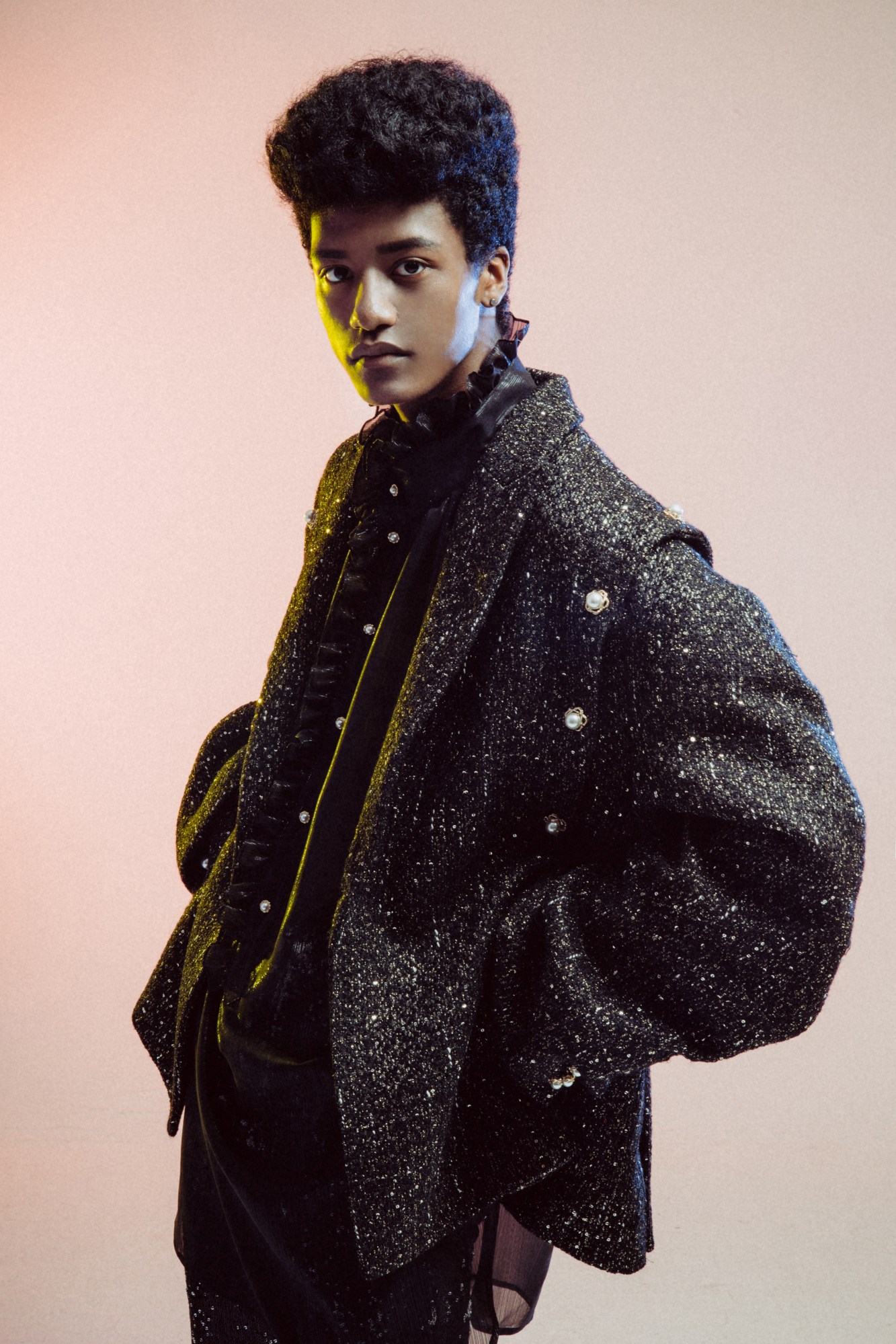When Koreans ask Hyun-Min Han whether he is African or American, they’ll find themselves surprised to learn that he is actually from Itaewon — a vibrant district in Seoul known for its barbecue restaurants, upscale bistros and nightlife — and that his parents are Nigerian and South Korean.
“I get all the attention as soon as I step out onto the street,” the biracial fashion model tells i-D. “It’s because I’m tall, skinny and dark-skinned. It can definitely be inconvenient,” he says, “but I’ve grown used to it.”
There’s a reason for the behaviour Hyun-Min describes. South Korea is one of the most homogeneous countries in the world. According to World Atlas, ethnic Koreans constitute for 96 percent of the population, affording locals few opportunities to interact with other nationalities without going abroad. The country also remains fiercely nationalistic — something that can be traced back to the Japanese occupation in World War II — which has left many with certain attitudes towards those they consider “outsiders.”
“Korea hasn’t really had a multicultural multi-ethnic history up until very recently. For a long time, it’s been known as the ‘hermit kingdom,’” says Jainnie Cho, a The New York Times editor who hails from Seoul. “It’s still quite a closed-off society, even though there is now a sizeable expat community and many migrant workers from other parts of Asia.”

But despite being historically insular, South Korean society is also increasingly influenced by black American culture. Some of South Korea’s biggest pop stars have been incorporating elements of African-American culture into their look and sound.
CL, the leader of YG Entertainment’s girl group 2NE1, appeared wearing grills and gold chains in her 2013 single “Baddest Female”. In 2015, she enlisted the help of the New Zealand-based ReQuest dance crew for another solo release “Hello Bitches.” While none of the women from ReQuest who appeared in CL’s video were black, that didn’t preclude the tanned skin, cornrows and twerking. In 2016, Big Bang’s Taeyang used an app to merge his face with Kanye West’s and wished his fans a “happy monkey new year.” The group had previously come under fire when fellow band member G-Dragon posted a photo of himself in blackface which many believed was a reference to Trayvon Martin, whose murder was one of the events that catalysed the Black Lives Movement in 2013.
“I didn’t realise how much Koreans liked hip-hop or Black-American pop culture until I moved here,” says model Taylor M. Rivers, who moved to South Korea almost three years ago and has since walked for brands like D-Antidote, Greedilous and Charm’s at Seoul Fashion Week.
“Koreans are wearing dreadlocks or Afro-style hair, and are listening to [musicians] like Earth, Wind & Fire or Kanye West,” adds Hyun-Min.
The appropriation of black culture by young South Koreans can be partly traced back to the country’s wildly popular breakdance scene. Originally founded in the 70s, breakdance was big among black youth in New York’s Bronx. B-boys and b-girls were influenced by everything from James Brown to Brazilian capoeira and gymnastics. Breakdancing may be mostly a thing of the past in America, but it’s a different story in South Korea, where b-boys and b-girls are a big part of youth culture. In the 2007 documentary Planet B-Boy, director Benson Lee credited a visiting Korean-American hip-hop promoter named John Jay Chon with spawning the b-boy explosion in Seoul. And it’s become even more prevalent now.

As hip-hop and rap overtook rock as the biggest music genre in the US for the first time in 2018, Korean hip-hop — abbreviated as “K-hop” — has become “a major music industry among young generations in South Korea,” explains Euna Cho, the Korean-born studio manager of menswear fashion brand Per Götesson. The movement has since spawned local hip-hop acts like Epik High, who became the first Korean group to be hosted at Coachella in 2017, even though the country has historically been known for its monumental K-pop scene.
For South Korean b-boys and b-girls, fashion and function work hand-in-hand. Beanies make it easier for dancers to spin on their heads. Thick-soled shoes are used for their durability. Euna spotted “masculine silhouettes, bold accessories and strong graphic T-shirts” worn by b-stylers when she was in Seoul. Homegrown street brands like Ader Error, D-Antidote, Charms, We11 Done and Kanghyuk have since grown out of this movement. “I saw A$AP Rocky wearing Kanghyuk in his new music video!” she says.
“Hip-hop and urban streetwear has become a major reference point in Korean fashion,” says Park Hwan-Sung, founder and creative director of the Seoul-based fashion label D-Antidote, which counts big-name K-pop artists such as Shinee, Super Junior and BTS as fans. For his latest collection shown at Seoul Fashion Week, Park was inspired by Space Jam, the 90s sports comedy film starring basketball player Michael Jordan. “I thought it was a well-timed concept,” he says.
Yet, there is still a disconnect between what Koreans see as paying tribute to hip-hop culture and what the rest of the world sees as as at best tacky, and at worst as cultural appropriation. Observers have taken to western forums like Quora and Korean fan sites like Allkpop to question this, starting threads such as “Why do Asians keep stealing African-American culture?” and “Why are black people facing racism in K-pop?”
South Korea has historically been a country where racism is rife: celebrities have appeared in blackface make-up on national television, while BTS’ Jiimin used the word “ kkamdoongie (깜둥이)”, a derogatory term for black people, in a YouTube video. The racial slur “ heughyeong (흑형),” meaning “black brother”, is common these days, especially for younger generations, because many Koreans feel that it has no negative connotations.
Others however believe that such behaviour is fetishistic rather than inclusive. “People stare at you, they want to take pictures with you like an animal, taxis pass you up. I have friends who have told me that people have randomly touched their skin or hair,” says Jason Waller, who goes by ‘Pinnacle the Hustler’ and works as a club owner and rapper.
Waller moved to Seoul from Cincinnati, Ohio just over a decade ago and found himself being “treated differently” because of the colour of his skin. But he also says being black in Korea has worked in his favour sometimes. “Many Koreans like black culture. I’m pretty sure I get booked as a DJ a lot because I’m black, which in their minds, adds authenticity to the atmosphere,” he laughs.
“It has been controversial,” says Laranzo Dacres. Laranzo, who goes by Ranzo, is the creator behind popular YouTube series The Black Experience, in which he documents what it’s like living as a black person in Asia (the most popular episode received 1.9 million views). While Ranzo is based in Tokyo, participants in his videos have included those living in China and South Korea. He says he’s not keen on the idea of “individuals who are not within the black community [combining] desired elements of black culture into their own style.”
“One of the main reasons for this is that elements of black culture have routinely been commodified by other groups with a complete disregard for black people,” Ranzo says. “There are those who love black culture, but not so much the black people behind the culture. I say this because in Korea, there have been instances where black people are turned away from clubs, yet the irony is that the songs of black hip-hop artists are playing inside these very places.”
In the same way that clubs playing black music don’t always allow black people in them, “There are fashion brands that emulate black styles without having a single black model in their lookbooks or runways,” Taylor says of the Korean fashion industry. “I don’t mind that people appreciate black American culture. But when people want to simply take or copy aspects of it without acknowledging the people who created it, that makes me uncomfortable.”
Ranzo notes it’s not dissimilar from the “b-style” youth subculture that took hold of Japan a decade ago, which prompted devotees to braid their hair, dress in “urban” fashion, wear coloured contact lens to lighten their eyes and routinely darken their skin at tanning salons – a departure from the traditional norms of beauty in Asia, where women are expected to have fair, porcelain-like skin, long glossy hair and large round eyes.
“People all over the world – not just Asia – may like the way we walk, talk, act, sing or dance. But when it comes to our struggles, they want nothing to do with that,” Jason says.
When South Korean president Moon Jae-in first ran for office in 2012, he vowed to pass a comprehensive anti-discrimination law. Then in 2014, Chung Chin-Sung, a professor of sociology at Seoul National University, became the first Korean member of the UN’s Committee on the Elimination of All Forms of Racial Discrimination. But little progress has been made.
In the World Report 2019 by the Human Rights Watch, in which human rights practices in over 100 countries are reviewed, the non-governmental organisation said that Moon had failed to raise human rights issues in this last three summits of 2018 and has not done enough to defend the rights of women, refugees and LGBT individuals in South Korea.
The reality is that there is still no anti-discrimination law in Korea. The National Human Rights Commission of Korea are virtually powerless to enforce any anti-discrimination measures. For any government that truly believes in fighting bigotry, a comprehensive anti-discrimination act is key.
“There’s a Korean saying that goes, ‘a cornered stone meets the mason’s chisel,’ which basically means being different is frowned upon,” says Hyun-Min, who is currently working on shows and campaigns in Paris and New York, and plans to leave South Korea in the near future – although he says it has more to do with “developing his career” as a model and actor than racism.
Fashion, in many ways, thrives on the cross-pollination and growth of culture. Without the freedom to embrace fantasy and interpretation, borders stay closed and stereotypes remain. But amid cultural revolution and creativity, there needs to be wider education and awareness, as cultural appropriation still persists in troubling ways. For new forms to emerge, South Koreans will need to dig further into black culture than to simply view it as a means to coolness.


